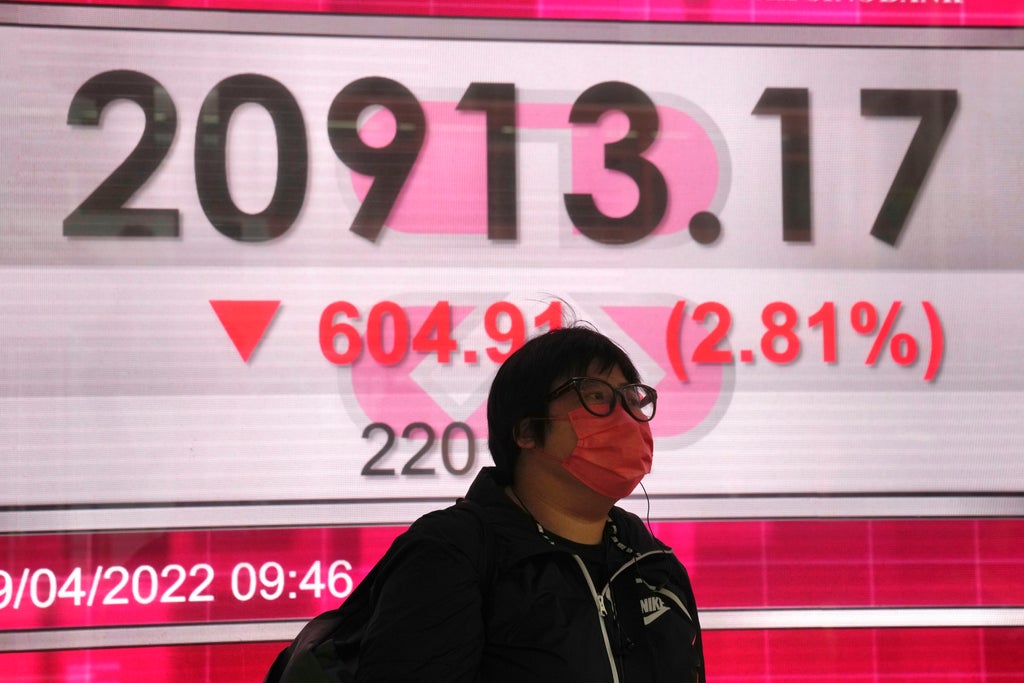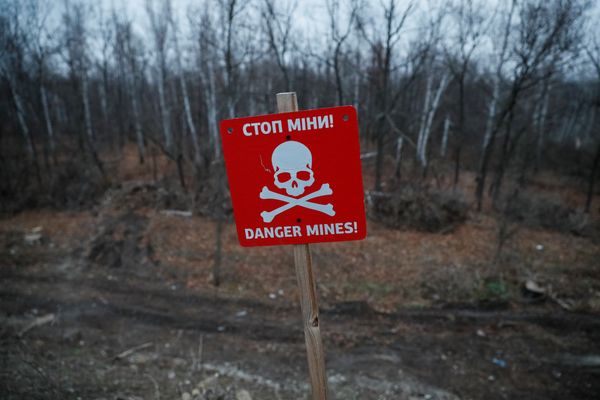
Shares were mostly higher in Asia on Tuesday after China’s central bank moved to provide more support for its slowing economy.
Oil prices fell back, while U.S. futures advanced, suggesting investor sentiment remains resilient despite worries over the risks of recession as prices push sharply higher while economies are still recovering from the impact of the pandemic.
Hong Kong's Hang Seng index declined 2.2% to 21,058.78, weighed down by worries over Chinese property developers and regulatory crackdowns on technology companies.
The People's Bank of China conducted a 10 billion yuan ($1.6 billion) reverse repo operation to help add liquidity to the banking system, the state-run Xinhua News Agency reported. In a reverse repo, the central bank buys securities from commercial banks with an agreement to sell them back in the future.
Meanwhile, the central bank, through a banking industry association, encouraged smaller lenders to reduce the interest they offer on deposits to alleviate pressure on their finances, the financial magazine Caixin reported.
On Friday the PBOC reduced the amount of reserves banks have to keep, to free up more money for lending.
China reported Monday that its economy grew at a 1.3% quarterly pace in January-March, down from 1.4% in the previous quarter. It expanded at a 4.8% annual pace, which was better than expected, but economists noted that the impact of shutdowns in dozens of cities, including Shanghai, to control coronavirus outbreaks was still to come.
The Shanghai Composite index lost less than 0.1% to 3,194.03.
But most other regional markets advanced. Tokyo's Nikkei 225 index rose 0.7% to 26,985.09 and the Kospi in Seoul added 1% to 2,718.89. In Sydney, the S&P/ASX 200 gained 0.6% to 7,565.20. India's Sensex climbed 0.2% and Bangkok's SET jumped 0.7%.
Japan's finance minister, Shunichi Suzuki, on Tuesday reiterated his concern over the yen's weakening against the U.S. dollar. The dollar has risen sharply against the yen — a consequence of a divergence in monetary policies of the Bank of Japan, which is keeping interest rates low to nurse along the faltering economy, and the Federal Reserve and other central banks that are raising rates to combat surging inflation.
The dollar briefly topped 128 yen and was trading at 127.86 yen late Tuesday. It has been hovering at 20-year highs for weeks.
A weaker yen makes Japanese exports more competitive overseas and enhances yen-denominated profits of companies when they convert them from dollars, but it also raises costs for imports of oil and gas, food, manufacturing inputs and other necessities for the world's third-largest economy.
Rising prices for energy and food are adding to concerns over how the Fed and other central banks will bring inflation under control without hindering a revival of business activity following the doldrums brought on by efforts to vanquish coronavirus outbreaks.
The conflict in Ukraine, which has added to those price pressures, showed no signs of easing as Russia launched a long-feared, broad ground offensive Monday, seeking to take control of Ukraine’s east.
“One of the biggest problems is that finding a dissenting voice on the global procession to recession is getting increasingly rare. The negativity about the economy is pervasive, and that alone can keep stock pickers sidelined," Stephen Innes of SPI Asset Management said in a commentary.
On Wall Street, stocks closed slightly lower after a wobbly day of trading Monday, as worries about interest rates and inflation overshadowed some better-than-expected profit reports.
The S&P 500 slipped less than 0.1% to 4,391.69. The Dow Jones Industrial Average lost 0.1% to 34,411.69 and the Nasdaq composite index fell 0.1% to 13,332.36.
Smaller stocks also faltered, with the Russell 2000 index finishing down 0.7% at 1,990.13.
Counterbalancing losses were some better-than-expected profit reports. Bank of America rose 3.4% after reporting stronger profits than analysts forecast.
Energy producers continue to be big winners from surging prices for oil and gas. The war in Ukraine is pushing up demand for U.S. gas as European customers try to turn away from Russian supplies. Natural gas leaped Monday, with the U.S. price up 7.1% and near its highest level since 2008.
In other trading:
The price of benchmark U.S. oil fell 84 cents on Tuesday to $107.37 per barrel in electronic trading on the New York Mercantile Exchange. It rose 1.2% to settle at $108.21 per barrel on Monday.
Brent crude, the international pricing standard, shed 65 cents to $112.51 per barrel.
The euro slipped to $1.0778 from $1.0781.







